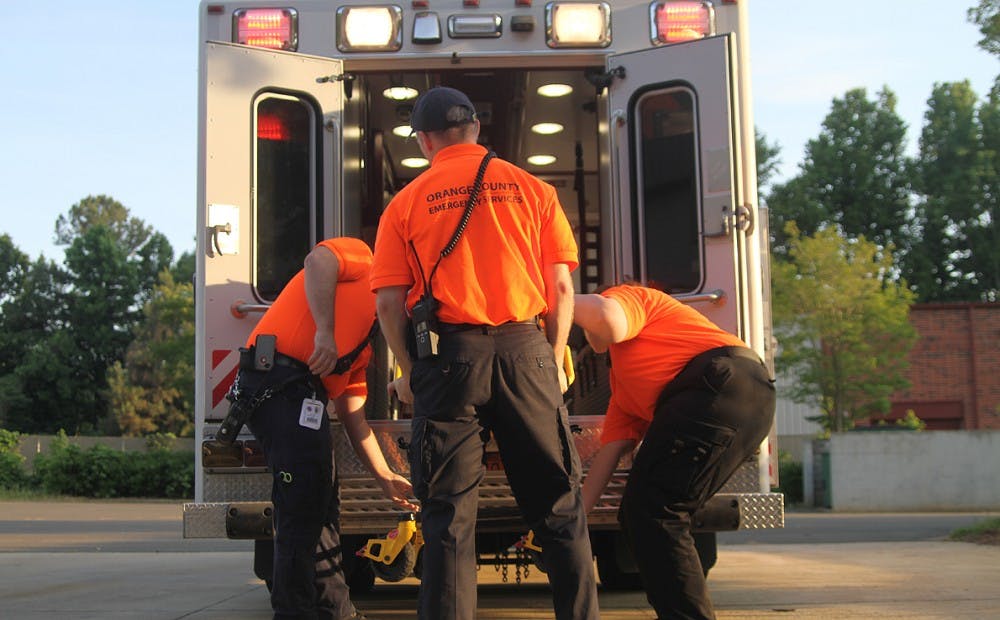Kim Woodward, the operations manager who collected the data, said the number of alcohol-related calls involving students often increases from the spring to the fall, prompted by the season change and the start of a new school year.
But Dean Blackburn, assistant dean of students, said he thinks this year’s spike is due to a concentrated push on campus to promote calling for help when it’s needed.
“We’ve been practicing a ‘See something, say something’ technique — if you see someone in need, do something to assist and don’t be a passive bystander,” Blackburn said, adding that the emphasis on calling began in summer 2012.
“We believe that has played out in the increased number of calls.”
Jeff Phillips, an E.R. nurse who has worked at UNC Hospitals for 18 years, said though calls might be more frequent, the vast majority of intoxicated students who come in don’t require much medical care.
“For the most part, they just sleep it off,” he said.
“We keep an eye on them, give them a warm bed, just let them lay there — it’s like a drunk tank, almost.”
A new law on the table
Al Hunt, an EMS supervisor, said when he hears of instances where students didn’t call 911, it’s always for the same reason.
“They’ll say, ‘I didn’t call because … I didn’t want to get in trouble,’” he said.
Now, under new legislation passed through the N.C. General Assembly in April, students are subject to limited immunity from legal consequences in some situations — even if they’re underage.
To get the day's news and headlines in your inbox each morning, sign up for our email newsletters.
Students must meet three criteria in order to be protected under the new legislation, said Dave Crescenzo, an attorney with Student Legal Services.
He said students must be the first to call for help, give their real names and remain with the person until authorities arrive.
“In that situation, if you were under 21 and the police find alcohol, they would not be able to charge you with possession or consumption,” he said.
But while students might not get in legal trouble, they still could be charged with a violation of the Honor Code — a loophole that the University is now working to rewrite.
Blackburn said his office, which is in charge of rewriting the policy, wants to keep the University operating in the same spirit as the legislation.
“So we are working now in trying to devise some language to our policy that will speak to where and when the University will also observe a medical amnesty approach,” he said.
Crescenzo said before the legislation, the de facto position of both law enforcement and the University had been not to get students in trouble — but the rules were unwritten, and there were exceptions.
“Whether somebody was charged before was always up to the cops,” he said.
“I’m sure people were charged, and in the end, that’s what created the problem.
“People would fear calling the cops and forgo getting assistance.”
Blackburn said he hopes to have a policy solidified by August, in time for students to return to school.
Unpredictable results
Proponents of the legislation have said its intentions are clear — to encourage students to call for help, comforted by the fact that they won’t get in legal trouble if they do so.
“The classic situation is the frat party,” Crescenzo said. “Somebody’s been chugging purple Jesus and is passed out on the floor, and rather than, ‘Oh my God, this guy’s barely breathing,’ they would just put him to bed and go home or some stupid thing like that.
“(The new law) addresses that problem.”
But as the University considers how it might incorporate the law into its own policies on campus, others are saying that consequences for students must be put in place.
Chris Baker, a part-time EMT-basic in Orange County, said the protection students are granted under the new law has the potential to pose a big problem for the state.
“It’s going to make students feel like they have leeway to get out of trouble.”
Rich Eldridge, an Orange County paramedic, said a lack of consequences might promote irresponsible behavior surrounding drinking.
But he said potential consequences — no matter how severe — shouldn’t stop students from asking for help.
“If some 18- or 19-year-old is going to go out, get hammered drunk and pass out on the sidewalk, and his friend calls for him because he’s worried about him, that’s a good thing,” Eldridge said.
“But if that person that got drunk and passed out reaps no consequences from his actions, then what’s going to stop him from doing it again?”
But Blackburn said students would likely still have some consequences to face, regardless of how the University chooses to move forward.
“Ideally, in most cases, students would not be facing judicial repercussions in calling for help,” he said.
“It doesn’t mean that they wouldn’t be meeting with someone like myself who is trained in counseling on safety and decision-making.”
Dave Sinkiewicz, an EMT-basic in Orange County, said it can be frustrating to expend so many resources dealing with calls from students who simply consumed more alcohol than they could handle.
“That’s the only thing they don’t teach here,” he said. “How to drink.”
Contact the desk editor at university@dailytarheel.com.



